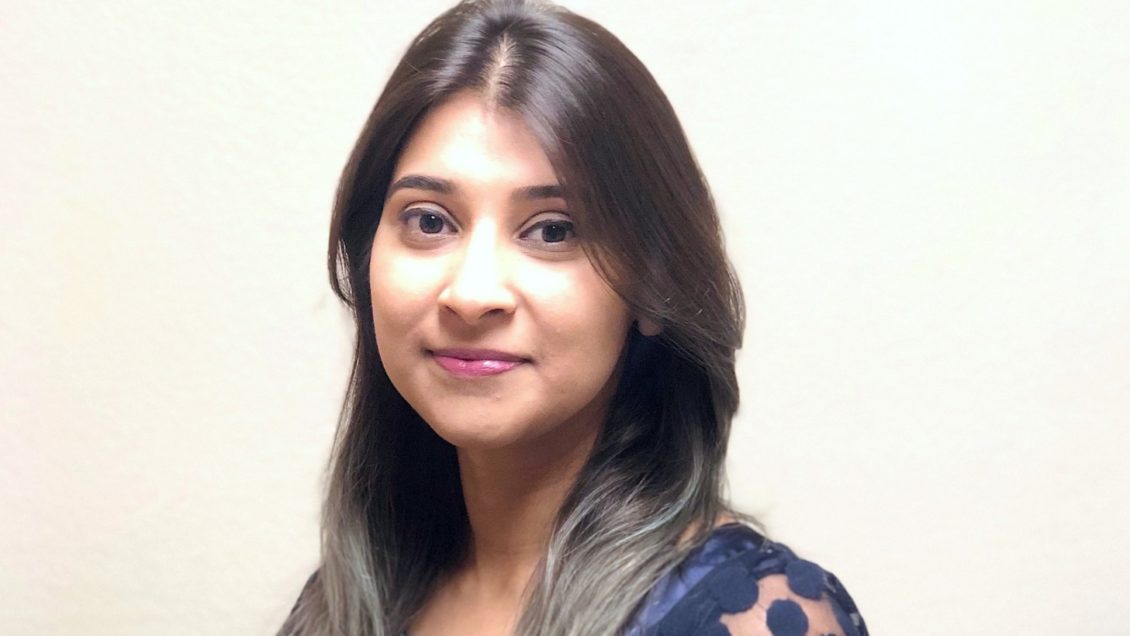Benafsh Husain Sapra will soon become the first person to hold a Ph.D. in biomedical data science and informatics as part of a program jointly offered by Clemson University and the Medical University of South Carolina.
Sapra successfully defended her dissertation on April 8 in a meeting conducted entirely over Zoom, the video conferencing platform, so that she, the members of her committee and her supporters could practice social distancing to help prevent the spread of COVID-19.

The defense was memorable for multiple reasons. Not only did Sapra conclude six years of graduate study, but her success represented a major milestone for a growing graduate-degree program and showed that the dissertation defense, a hallmark of the Ph.D. experience, can continue online during the COVID-19 situation.
A week later, Sapra said it still felt weird to be done.
“I have adrenaline still pumping through my veins,” she said with a big smile. “I feel like I should be working. But I did take a 17-hour nap after my defense.”
Sapra started her graduate studies in computer science and shifted her focus in 2017 when Clemson and MUSC launched the biomedical data science and informatics program. It’s an interdisciplinary graduate-degree program that gives students access to Clemson’s strengths in computing, genomics, engineering and public health and MUSC’s expertise in biomedical sciences.
The idea is to prepare aspiring data engineers and scientists to manage and analyze the massive amounts of data that have begun to pour from a wide variety of sources, ranging from mobile sensors to imaging devices.
The program represents the future of higher education, said Alex Feltus, who is Sapra’s Ph.D. advisor and a professor of genetics and biochemistry at Clemson.
“I believe that this is exactly the kind of interdisciplinary-interinstitutional program that will propel higher education in the 21st century,” he said. “It’s really important to bust out of the silos, and that’s at a departmental, college and university level. I’m really proud to be part of this. This is the way it needs to go to solve big problems like COVID-19 or cancer.”

The diversity of the program’s expertise was reflected in Sapra’s committee. Members included: Feltus; Brian Dean, a professor of computer science at Clemson and a coordinator of the biomedical data science and informatics program; William Richardson, an assistant professor of bioengineering at Clemson; Melissa Smith, an associate professor of electrical and computer engineering, and associate dean focused on inclusive excellence in Clemson’s College of Engineering, Computing and Applied Sciences; and Jamie Barth, an associate professor in the College of Medicine at MUSC.
When it was time to defend her dissertation, Sapra logged into Zoom from a bedroom in her California home, where she and her husband now live. Feltus sat a card table in the bedroom of his Clemson home, and Dean was in the study of his Clemson home. Others joined from elsewhere.
Participants found some advantages to holding a dissertation defense online instead of in person.
Dean used a feature on Zoom to send messages to colleagues without interrupting the presentation. Feltus took a few screenshots that Sapra is saving to remember her big day.
All or nearly all the students in the program attended Sapra’s defense as a show of support.
“Benafsh was the first Ph.D. to graduate from the program, so everyone was really psyched to see that milestone happening in real time,” Dean said. “At one point we had 20 people on the call.”
Sapra took about 40 minutes to give her presentation and then answered committee questions in a closed-door session for about three hours. Everyone has approved her dissertation, and all that’s left to make her Ph.D. official is a little administrative work, Feltus and Dean said.
Sapra will be quickly putting her degree to use with a new job as a bioinformatics engineer at Fulgent Genetics. It’s a step forward for her and the program.
“This is really good because every time we have students applying to the program they ask me where our graduates are ending up,” Dean said. “Now I can answer that question and relate some success stories. We think there is a lot of promise ahead of us.”
Get in touch and we will connect you with the author or another expert.
Or email us at news@clemson.edu

